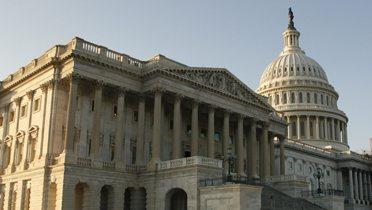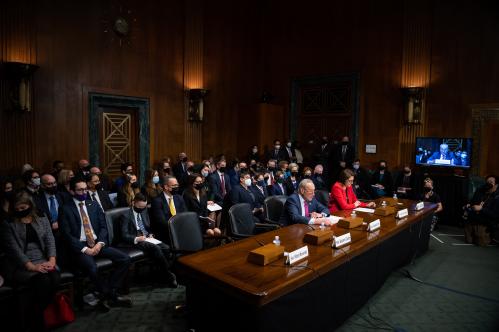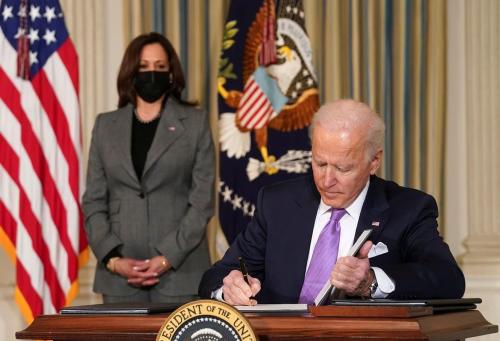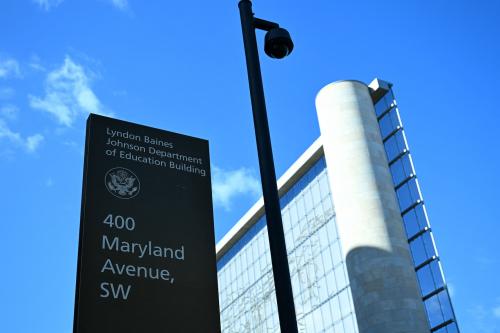With the recent passing of Justice Ruth Bader Ginsburg and ensuing speculation over whether Republican senators will confirm the president’s nominee before the 2020 election, the role of the U.S. Senate has taken center stage. Such an imbroglio leaves the impression that the Senate plays a pivotal role in the appointments process, and while they most certainly pay attention to Supreme Court nominations, their broader role as a check on the president’s appointment power has diminished. Findings released in a new report, “The Replacements: Why and How “Acting” Officials are Making Senate Confirmation Obsolete,” reveal the Senate’s weakness as a check on the president’s appointment power. In short, the sheer number of federal vacancies in combination with a slew of “acting” officials in key positions have sidelined the Senate, raising important questions about government performance and our system of checks and balances.
Prepared in a collaboration between The Brookings Institution and the Partnership for Public Service, our report provides data showing that after nearly an entire first term in office, thirty-nine key positions across the fifteen departments were never filled, while 131 key positions are vacant. Take, for example, the Justice Department where a full 31% of the Senate-confirmed positions were continuously vacant, and over half (55%) were unfilled as of August 17, 2020. (See Table 1.) Even the savviest business consultant might not be able to help our government manage effectively amidst this massive leadership vacuum. Meanwhile, the institution that could do the most about this problem has mostly remained silent. One might think that a president’s failure to nominate qualified individuals for these key positions would draw the Senate’s attention, but it appears to be of little concern.
Table 1: Number of Senate-confirmed positions without a confirmed appointee in Cabinet-level departments as of Aug. 17, 2020
| Number of Senate-confirmed positions | Currently vacant positions | Continuously vacant positions under Trump | |||
| No. | % | No. | % | ||
| Agriculture | 13 | 4 | 31% | 1 | 8% |
| Commerce | 21 | 9 | 43 | 1 | 5 |
| Defense | 59 | 21 | 36 | 0 | N/A |
| Education | 16 | 7 | 44 | 2 | 13 |
| Energy | 23 | 3 | 13 | 0 | N/A |
| Health and Human Services | 18 | 3 | 17 | 3 | 17 |
| Homeland Security | 17 | 11 | 65 | 2 | 12 |
| Housing and Urban Development | 13 | 2 | 15 | 1 | 8 |
| Interior | 18 | 5 | 28 | 2 | 11 |
| Justice* | 29 | 16 | 55 | 9 | 31 |
| Labor | 14 | 4 | 29 | 2 | 14 |
| State** | 59 | 24 | 41 | 7 | 12 |
| Transportation | 22 | 10 | 45 | 3 | 14 |
| Treasury | 26 | 9 | 35 | 5 | 19 |
| Veterans Affairs | 12 | 3 | 25 | 1 | 8 |
*Does not include United States attorneys and United States marshals **Does not include ambassadors Note: Data includes full-time, civilian positions that are Senate-confirmed.
Source: The Partnership for Public Service and The Washington Post
Beyond the sheer number of vacancies, the president has opted to designate “acting” officials across the federal government at a pace that far exceeds his predecessors. By definition, these temporary leaders lack the authority and prestige that a Senate confirmation confers. Even more egregiously, however, President Trump named an individual to a high-level, acting position after his nomination had been withdrawn (Anthony Tata, “the official performing the duties of Deputy Undersecretary of Defense for Policy”). Similarly, President Trump designated Ken Cuccinelli as acting Deputy Secretary of Homeland Security after Senate Majority Leader Mitch McConnell made it clear that he would not get confirmed. Rather than identifying qualified individuals who could withstand the scrutiny of the Senate, President Trump has sidelined the chamber’s role and placed loyalists in these critical positions. If these recent examples of blatant disregard for the role of the Senate did not set off alarm bells, it is not clear what will.
Despite the Senate’s lack of concern, the report offers sensible recommendations that address the current imbalance, primarily amending the current law to remove ambiguities that enable presidents to circumvent the Senate. Such efforts are achievable, but only when senators agree on the necessity of fulfilling their constitutional role as a check on executive power.
A president’s repeated circumvention of the Senate confirmation process not only does lasting damage to the institution, but it has a profound effect on government performance. Temporary leadership by individuals not deemed suitable for formal nomination jeopardizes agency performance, inhibits long-term planning and damages morale. This study’s findings should be a wake-up call to the U.S. Senate to rise up and reassert their role in the presidential appointments process.
The Brookings Institution is committed to quality, independence, and impact.
We are supported by a diverse array of funders. In line with our values and policies, each Brookings publication represents the sole views of its author(s).








Commentary
Vacancies, acting officials and the waning role of the U.S. Senate
September 24, 2020